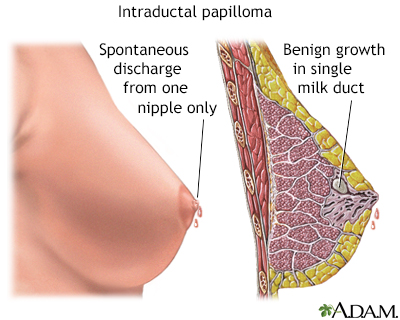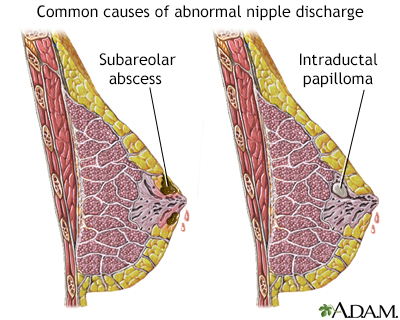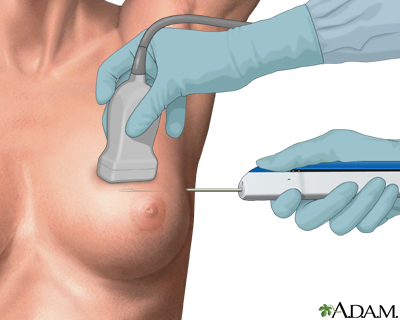Intraductal papilloma
Intraductal papilloma is a small, noncancerous (benign) tumor that grows in a milk duct of the breast.
Images



I Would Like to Learn About:
Causes
Intraductal papilloma occurs most often in women ages 35 to 55. The causes and risk factors are unknown.
Symptoms
Symptoms include:
- Breast lump
- Nipple discharge, which may be clear or bloodstained
These findings may be in just one breast or in both breasts.
For the most part, these papillomas do not cause pain.
Exams and Tests
The health care provider might feel a small lump under the nipple, but this lump cannot always be felt. There may be discharge from the nipple. Sometimes, an intraductal papilloma is found on a mammogram or ultrasound, and then diagnosed by a needle biopsy.
If there is a mass or nipple discharge, both mammogram and ultrasound should be performed.
If these are normal, then breast MRI is sometimes recommended. If the MRI is normal, a needle or surgical biopsy may be performed to rule out cancer.
An intraductal papilloma is diagnosed on needle or surgical biopsy.
Treatment
If there is nipple discharge, the duct is removed with surgery if imaging did not show a lump that can be checked with a needle biopsy. If a needle biopsy shows an intraductal papilloma, the papilloma may be removed with surgery, or watched over time with exams and imaging.
Outlook (Prognosis)
For the most part, intraductal papillomas do not appear to increase the risk of developing breast cancer.
The outcome is excellent for people with one papilloma. The risk for cancer may be higher for:
- Women with many papillomas
- Women who get them at an early age
- Women with a family history of cancer
- Women who have abnormal cells in the biopsy
Possible Complications
Complications of surgery can include bleeding, infection, scarring, and anesthesia risks. If the biopsy shows cancer, you may need further surgery and treatment.
When to Contact a Medical Professional
Contact your provider if you notice any breast discharge or a breast lump.
Prevention
There is no known way to prevent intraductal papilloma. Breast self-exams and screening mammograms can help detect the disease early.
Related Information
TumorReferences
Cox DM, Lippe C, Geletzke AK, et al. Etiology and management of benign breast disease. In: Klimberg VS, Gradishar WJ, Bland KI, Korourian S, White J, Copeland EM, eds. Bland and Copeland's The Breast: Comprehensive Management of Benign and Malignant Disorders. 6th ed. Philadelphia, PA: Elsevier; 2024:chap 14.
Davidson NE. Breast cancer and benign breast disorders. In: Goldman L, Cooney KA, eds. Goldman-Cecil Medicine. 27th ed. Philadelphia, PA: Elsevier; 2024:chap 183.
Klimberg VS, Hunt KK. Diseases of the breast. In: Townsend CM Jr, Beauchamp RD, Evers BM, Mattox KL, eds. Sabiston Textbook of Surgery. 21st ed. Philadelphia, PA: Elsevier; 2022:chap 35.
BACK TO TOPReview Date: 11/25/2023
Reviewed By: Debra G. Wechter, MD, FACS, General Surgery Practice Specializing in Breast Cancer, Virginia Mason Medical Center, Seattle, WA. Also reviewed by David C. Dugdale, MD, Medical Director, Brenda Conaway, Editorial Director, and the A.D.A.M. Editorial team.

Health Content Provider
06/01/2025
|
A.D.A.M., Inc. is accredited by URAC, for Health Content Provider (www.urac.org). URAC's accreditation program is an independent audit to verify that A.D.A.M. follows rigorous standards of quality and accountability. A.D.A.M. is among the first to achieve this important distinction for online health information and services. Learn more about A.D.A.M.'s editorial policy, editorial process and privacy policy. A.D.A.M. is also a founding member of Hi-Ethics. This site complied with the HONcode standard for trustworthy health information from 1995 to 2022, after which HON (Health On the Net, a not-for-profit organization that promoted transparent and reliable health information online) was discontinued. |
The information provided herein should not be used during any medical emergency or for the diagnosis or treatment of any medical condition. A licensed medical professional should be consulted for diagnosis and treatment of any and all medical conditions. Links to other sites are provided for information only -- they do not constitute endorsements of those other sites. © 1997- 2025 A.D.A.M., a business unit of Ebix, Inc. Any duplication or distribution of the information contained herein is strictly prohibited.
